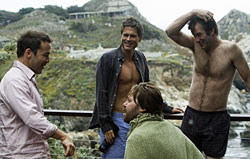A Chat with Thomas Jane, Rob Lowe and Jeremy Piven of “I Melt with You”
The stars of “I Melt with You” want you to know this: this film is no one’s idea of “product.” Opening in theaters this weekend in limited release after a run on VOD, it’s a movie made by guys who are clearly trying like crazy to do something that’s far from the current run of the mill — and also paying tribute to John Cassavetes’ 1970 masculine emota-fest, “Husbands.” Jeremy Piven calls it “an existential horror film,” and Rob Lowe calls it “impressionistic,” and that’s about as good and relatively flattering a description as any. The highly intense drama first screened at Sundance to a number of walk-outs, a matter which one of our speakers will address shortly.
Directed by Mark Pellington (“Arlington Road,” “U2 3-D”) and written by first-timer Glenn Porter, “I Melt with You” stars Rob Lowe, Thomas Jane, Jeremy Piven and Christian McKay (“Me and Orson Welles”) as four smart yet deeply stupid 40-something college buddies who reunite for drug and booze-laden fun in Northern California’s ultra-scenic Big Sur. Let’s just say that after way too much fun, things take a sharp and very unfortunate left turn. Despite the appearance of Carla Gugino as a sympathetic local constable and Sasha Grey as a Sasha-licious coed, as well as some great vintage punk rock, we are left to wonder if maybe these guys would have been a lot better off if they’d listened to Nancy Reagan back in the day and went the “just say no” route. Also, suicide pacts are never a good idea.
Bullz-Eye and a select group of other journalists were fortunate enough to meet with Jane, Lowe and Piven — three strong veteran talents known to just about everyone with access to a television screen, most recently for “Hung,” “Parks and Recreation” and “Entourage,” respectively. They discussed the film and, as much as we could manage, other things.
On the choice to make “I Melt with You.”
Rob Lowe: I knew that if the movie was done correctly it would be so provocative, it would push so many buttons, that people would definitely get up and leave — if we did it right! If we did it wrong, then that wouldn’t happen. That appealed to me. Coming from a lot of network television and studio filmmaking, today it’s “Don’t ruffle the audience,” “Gain as much acceptance as you can.” It’s the center-of-the-net philosophy.
Jeremy Piven: As an actor, there was no place to hide with this movie. Everything was kind of right there. That’s what you look and hope for. It would be great if movies like this were being made on all sorts of different levels, but that’s not the case. Mark [Pellington], like Cassavetes, said, “I’m just going to make this. I’m not going to wait for anyone to give me the money. I’m going to grab these cameras, and these guys, and I’m just going to go shoot it.”
Thomas Jane: You have to really put your ego aside as an actor. This isn’t a movie where we’re going to look good and be standing in the place with the right light. This is not that movie. You’re exposed, you’re naked, you’re bare. You have to put your ego aside… This is about revealing, it’s not about covering up.

On the unusual shooting style of “I Melt with You.”
RL: It was amazing. First of all, you have four or five cameras. They’re tiny. They’re little Cannon D5s. They’re still cameras, ostensibly. Mark would put the music on and, a lot of times, we would just go wild. Jeremy and I laugh that some of our best acting wasn’t even on screen, because you’d be doing your thing and realize that the camera had completely moved away from you and was now in that corner of the room.
TJ: We didn’t have make-up trailers. We didn’t have wardrobe people running around. We literally brought our own clothes from home. We had one make-up lady. We used the whole house. When we had like five cameras going all around the room, you could literally go walk anywhere… [What’s great is that], for the first time, we’ve got the equipment to do a low-budget, tiny movie like this and actually make it look fantastic.
RL: I think there’s a danger there, though. You don’t want to give a nuclear bomb to everybody. I would not be wanting to do this movie in the hands of somebody who was less of a visualist than Mark. Mark knows where to put the box. He can shoot his way around any and everything. I don’t know if I want some 19-year-old kid with a D5 running around in Big Sur… Otherwise, everybody can make a movie and everyone shouldn’t make a movie.
On why Thomas Jane chose to be an executive producer on “I Melt with You” and his excitement at working “in the Cassavetes spirit.”
To plant your flag on the ground and say, “I’m doing this film, it’s a real film.” It makes the film real as opposed to just another script that floats across your desk that people are looking for the financing and looking for this thing to come together. It’s all a bunch of bullshit. And the more scripts I read the less interested I am in stuff that doesn’t have anything attached. Today, we’re missing [personal/psychological filmmaking]. We’re missing any sort of quest for truth, In the 70s, it was very popular. Why did they make so many great movies in the 70s? It was because it was on the cover of fucking Time magazine. The interest in people’s psychology was a serious social issue that everybody wanted to explore. That’s why those movies got made. The people wanted to see it.
Jeremy Piven on our admittedly hopeless, but nevertheless obligatory, “Entourage” movie question.
You can go to your editor and tell him that you asked that question… [But] yeah, there is, we’re just waiting on a script on all that kind of stuff. And [“I Melt with You”] is kind of like that group of guys from “Entourage” had gotten together and went to a place that we never got to see during those eight seasons. This is unchartered territory for men relating to each other on camera.
Thomas Jane on growing up in America and the pain inside the “I Melt with You” guys.
There’s no room to express it. There’s no room in American society. Where do you put those emotions? As Americans, with the youth-obsessed culture, it’s just not permitted, it’s just not done. You’re expected to just sort of fade away into a family and a job when you’re 40 years old. If you don’t have that then, man, you are fucked in this culture. We’ve kind of lost the ability to communicate in our 30s and 40s. There are definite guidelines and rules for social bonding for men in their 20s. You get drunk and you get together and you watch football, and all that. But, man, it doesn’t change. In your 30s and 40s, the only way you can bond with men is to do the same thing you were doing in your 20s.

On the benefits of TV experience.
JP: We don’t have a lot of rust on us… I’ve never taken more than a few weeks off in my adult life from work, which is either commendable, or really tragic, I don’t know which.
RL: Probably a little bit of both. As they say in music, everybody’s chops are really up in this cast. Everyone has been carrying a television series. You’ve got to have your shit together to do that. There’s no faffing about your motivation or “would this character be drinking that bottle of wine?” There’s no time for that.
JP: A lot of the time it’s like, “This is your blocking…”
RL: Blocking! Right now I’m on a show that doesn’t even have blocking. No, no, no. There’s no marks. We don’t have marks on the floor. On “Parks and Recreation” it’s like, “We’re shooting in this area. Go.”
JP: One thing you do have is amazing writing.
RL: It helps. We stand on our fucking heads, it still works.
On surprises from actors, be it an impression we thought was impossible — like Rob Lowe’s hysterical Robert Wagner take from “The Spy Who Shagged Me” — or something a bit deeper.
RL: Thank you. I like to specialize in imitating people who, heretofore seem inimitable.
At this point, Mr. Piven somewhat misunderstands our question and attempts a Charlie Sheen impersonation; we explain that we didn’t necessarily mean impressions but anything an actor does that might genuinely surprise an audience.
JP: “I Melt with You” feels like [something very different] because the few people that have seen it — the few civilians that have seen it have come up to me and said, “I didn’t know that you had that in you.” I have no perspective on it so I don’t know what any of that means. I have stuff coming up where I’m playing an FBI agent opposite Miley Cyrus.
RL: I didn’t know he had it in him! I think that sounded dirty in that context!
Rob Lowe on future plans for his “Californication” recurring character, an A-list actor whom Lowe has previously said was largely drawn from about ten different performers of his acquaintance.
Most of the people who I stole from for Eddie Nero won’t speak to me anymore, but Eddie lives on… Unfortunately, now Eddie has decided that the thing that’s keeping him from true artistic integrity is sex, so he’s looking to have his genitals removed. It’s problematic.
Rob Lowe, on the personal impact of writing his revealing memoir, “Stories I Only Tell My Friends.”
I’ll tell you where it really helped me. It’s places like this, today. Talking to people [in the press]. I’ve laid it all out so big time that I’m not even self-editing. It’s not like I was a difficult person to interview in the past anyway, but once you’ve written your sort of life story, everything is downhill from there in a good way. Writing that book changed my life.
Related Posts
You can follow us on Twitter and Facebook for content updates. Also, sign up for our email list for weekly updates and check us out on Google+ as well.











